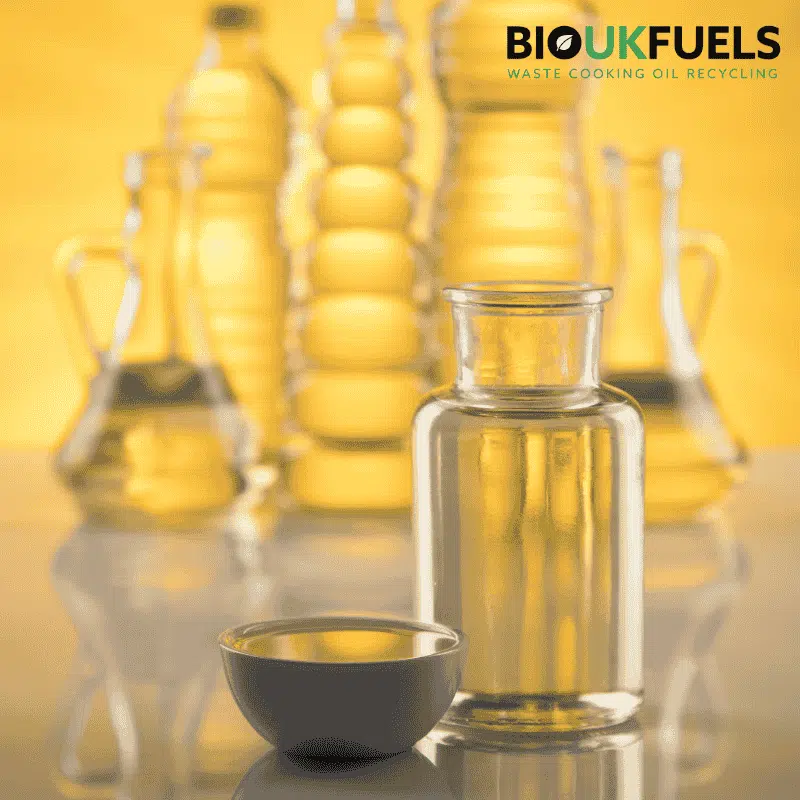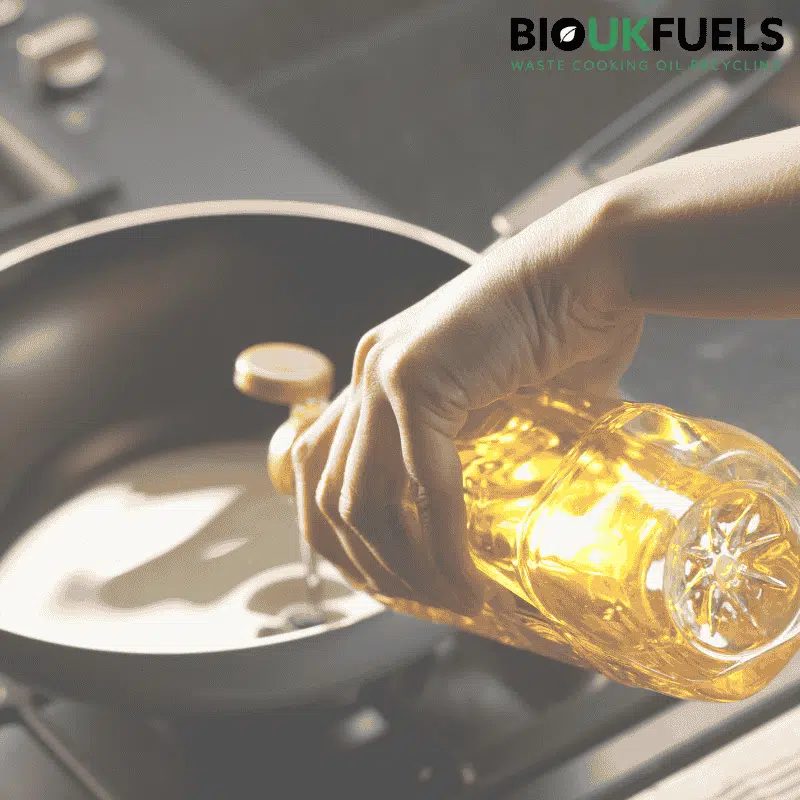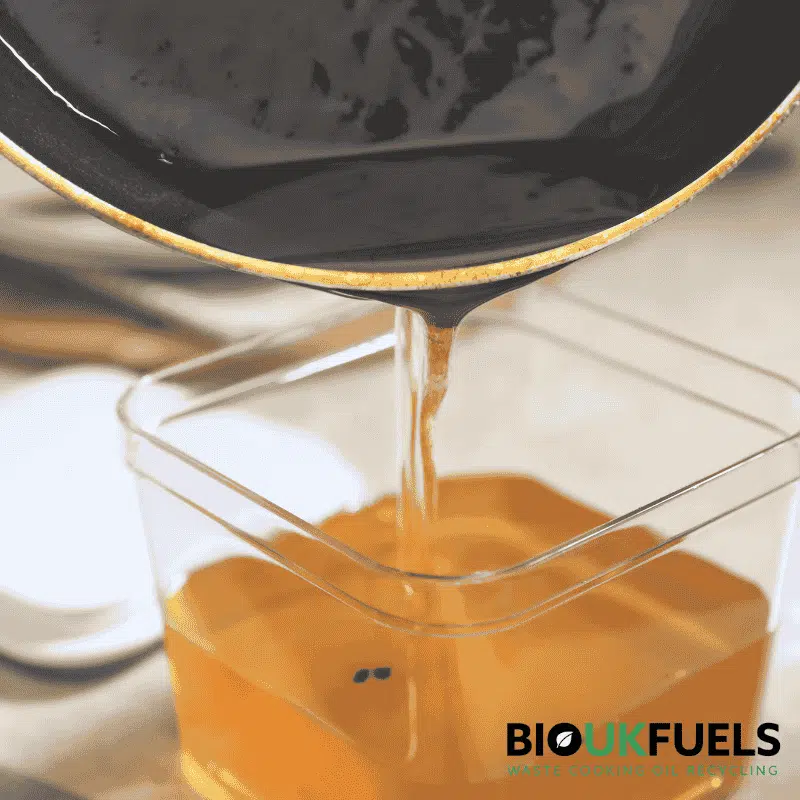

Rapeseed oil is one of the most widely used cooking oils in the UK, found in home kitchens and commercial food establishments alike. Its popularity is due to its versatility, neutral flavour, and high smoke point, making it a staple for frying, baking, and salad dressings. But how does it compare to other vegetable oils in terms of health benefits and risks?
Understanding rapeseed oil’s nutritional profile, processing methods, and impact on health is key to making informed dietary choices. Some studies highlight its heart-friendly monounsaturated fats and omega-3 content, while others raise concerns about ultra-processed versions.
For businesses using large quantities of cooking oil, responsible disposal is just as important as the oil’s health impact. If you’re in the food industry, learn about our waste oil collection services to ensure environmentally friendly recycling.
In this article, we’ll break down:
✅ How rapeseed oil is produced and refined
✅ The benefits and potential drawbacks of its consumption
✅ How it compares to other commonly used cooking oils
✅ Best practices for using rapeseed oil in commercial kitchens
If your business generates used cooking oil, explore how oil recycling for restaurants can reduce waste and improve sustainability.By the end of this guide, you’ll have a clear, science-backed answer to whether rapeseed oil is a healthy choice for your cooking needs.
Is Rapeseed The Same As Other Vegetable Oils, and How Does It Compare?
Rapeseed oil, commonly known as canola oil, is a widely used cooking oil that is classified as a vegetable oil. It is part of the Brassica family (related to Broccoli and Cauliflower). Many oils sold under the label ‘vegetable oil’ predominantly contain rapeseed oil, emphasising its commonality and significance in vegetable oil products. Additionally, culinary rapeseed oil is praised for its versatility and low saturated fat content.
In culinary applications, rapeseed oil is valued for its high smoke point, making it suitable for a variety of cooking methods, including Deep frying and baking. The high smoke point ensures that the oil maintains its stability at high cooking temperatures, preserving its nutritional value.
How Is Rapeseed Oil Made?
The production of rapeseed oil involves several key processes, beginning with the harvesting of rapeseed (Brassica napus) seeds. Notably, a company local to us, Yorkshire Rapeseed Oil is a popular choice among wellness influencers and health professionals who advocate for locally sourced options.
These seeds can be processed through methods such as cold pressing or more commonly through commercial refining to yield oil suitable for culinary applications. Cold-pressed oils are particularly esteemed for preserving flavour profiles and essential nutrients.
It is important to differentiate between industrial rapeseed oil and culinary rapeseed oil. Industrial rapeseed oil is utilized primarily in the automotive and chemical industries, making it unsafe for human consumption due to its high erucic acid content. In contrast, culinary rapeseed oil, known as canola oil, is designed for cooking and has much lower levels of erucic acid, ensuring safety for consumers.
Cold-pressed rapeseed oil is extracted at lower temperatures, which helps preserve its nutritional value and beneficial antioxidants, vital for combating oxidative stress and supporting heart health. In contrast, refined oils undergo extensive processing that may involve chemical treatments and high heat, potentially altering the flavour profile and reducing health benefits.Cold pressing entails mechanically squeezing the seeds without the application of heat, thus preserving essential nutrients such as antioxidants and phytosterols, which are vital for supporting heart health and overall well-being. Conversely, refined rapeseed oil undergoes a rigorous purification process that may remove some of these beneficial components, thereby impacting its health advantages.


What Are The Nutritional Values Of Rapeseed Oil?
Rapeseed oil possesses a commendable nutritional profile that renders it a valuable component of a balanced diet, supplying essential fatty acids and fat-soluble vitamins, such as vitamin E and K, that support healthy bodily functions and wellness brigade objectives. It is rich in monounsaturated fats, low in saturated fats, and contains substantial amounts of omega-3 and omega-6 fatty acids, which are beneficial for cardiovascular health and overall well-being. The appropriate balance between omega-3 and omega-6 fats helps mitigate inflammatory effects and supports heart health.
High In Monounsaturated Fats
Rapeseed oil is notably high in monounsaturated fats, which are recognised for their beneficial effects on cardiovascular health and overall well-being. These healthy fats can assist in reducing LDL cholesterol levels, thereby lowering the risk of cardiovascular diseases and promoting a balanced diet. The incorporation of monounsaturated fats into culinary practices can enhance flavour while contributing to a healthier lifestyle.
Research indicates that substituting saturated and trans fats with monounsaturated fats can lead to improvements in cholesterol profiles, further diminishing the likelihood of cardiovascular complications. Key benefits of these fats include:
- Enhancement of heart health
- Support for cholesterol regulation
- Reduction in the risk of heart disease
Incorporating a variety of sources of monounsaturated fats—not limited to rapeseed oil, but also including nuts, avocados, and olive oil—can contribute to a more diverse and nutritionally rich diet. This practice not only supports heart health but also aligns with dietary recommendations for balanced nutrition.
Good Source Of Omega-3 Fatty Acids
Rapeseed oils are highly regarded sources of omega-3 fatty acids, which are recognised for their anti-inflammatory properties and benefits to cardiovascular health. These oils are rich in vitamin E, an antioxidant that supports overall wellness and may reduce the risk of chronic diseases.
Incorporating omega-3-rich oils, such as rapeseed oil, into one’s cooking practices can enhance dietary choices. Omega-3 fatty acids are vital for cognitive function and may also support mental health. Therefore, it is important to achieve a balance with omega-6 fats, which are commonly found in processed foods.
- Achieving an optimal ratio of these fatty acids can help mitigate the risk of inflammation and cardiovascular diseases.
- The inclusion of rapeseed oil in the diet can provide a heart-healthy alternative, as it is rich in alpha-linolenic acid (ALA), one of the primary types of omega-3s.
Low In Saturated Fats
One of the significant advantages of rapeseed oil is its low saturated fat content, which positively impacts heart health and cholesterol management. A lower intake of saturated fats is frequently associated with a reduced risk of developing heart diseases, making rapeseed oil an appealing option for health-conscious consumers. By selecting oils that are low in saturated fats, individuals can effectively support their cardiovascular health and overall well-being.
The importance of dietary fats in overall health should not be underestimated. Research indicates that not all fats possess the same qualities, and the type of fat consumed plays a crucial role in influencing cholesterol levels and the risk of heart disease. By substituting saturated fats found in certain oils and animal-based products with healthier alternatives such as rapeseed oil, individuals can:
- Improve their cholesterol profile, as diets lower in saturated fats often result in a decrease in LDL (bad cholesterol).
- Enhance overall heart health, thereby contributing to a stronger cardiovascular system.
- Reduce inflammation throughout the body, which is beneficial for various chronic conditions.
Contains Vitamin E And K
Rapeseed oil is a valuable source of fat-soluble vitamins, including vitamins E and K, which are essential for maintaining optimal health.
Vitamin E, which is present in significant quantities in rapeseed oil, functions as a potent antioxidant, safeguarding cells from oxidative stress induced by free radicals. This role is critical in preventing cellular damage, which is associated with various chronic diseases, such as heart disease and cancer. Furthermore, vitamin E supports immune function and promotes skin health, contributing to overall well-being. Conversely, vitamin K is vital for blood clotting and plays an essential role in maintaining bone strength by regulating calcium levels within the body.
The synergistic effects of these vitamins underscore the importance of incorporating sources of both into one’s diet. A balanced intake of dietary fats is necessary for the absorption of fat-soluble vitamins, highlighting the benefits of including rapeseed oil in one’s nutritional regimen.


Does All This Make Rapeseed Oil Healthy?
The health implications of rapeseed oil, particularly cold pressed varieties, have been the focus of considerable research and discussion, with numerous studies emphasising its potential health benefits, particularly in relation to cardiovascular health.
Many health professionals, including wellness influencers, regard rapeseed oil, derived from the Brassica napus plant of the Brassica family, as a beneficial option due to its advantageous nutritional composition, which is characterised by high levels of monounsaturated fats, omega-3 fatty acids, and vitamin E.
Helps Improve Heart Health
Rapeseed oil has been demonstrated to support heart health by positively influencing cholesterol levels, particularly through the reduction of LDL cholesterol, which is a well-established risk factor for cardiovascular diseases. The combination of healthy fats and antioxidants in rapeseed oil may decrease the likelihood of heart-related issues, rendering it a preferred option for health-conscious individuals. Incorporating this oil into one’s diet may contribute to enhanced cardiovascular health and overall well-being.
Research indicates that the consumption of rapeseed oil is associated with a favourable balance of omega-6 and omega-3 fatty acids, which are essential for maintaining optimal cardiovascular functions.
- This balanced fatty acid profile aids in reducing inflammation.
- It also promotes improved endothelial function, which is crucial for maintaining the health of blood vessels.
Is Rapeseed Oil Inflammatory?
Rapeseed oil is recognised for its health benefits; however, recent discussions have raised concerns regarding its inflammatory potential due to the presence of omega-6 fatty acids. Some studies indicate that an imbalance between omega-3 and omega-6 fatty acids may contribute to inflammation, prompting questions about the overall impact of rapeseed oil on health. It is imperative for consumers to comprehend these implications and make informed decisions regarding their dietary fat choices.
Rapeseed oil, derived from the seeds of the canola plant and classified under the Brassica family, is characterised by a significant content of polyunsaturated fats, predominantly omega-6 fatty acids. These essential fats are vital for various bodily functions; nevertheless, excessive consumption in relation to omega-3s may promote inflammatory responses.
- Some researchers contend that a diet excessively rich in omega-6 fatty acids can lead to chronic inflammation, which is a precursor to numerous health issues, including cardiovascular diseases.
- Conversely, proponents of rapeseed oil emphasise its beneficial properties, arguing that it contains healthy monounsaturated fats and antioxidants that can help reduce inflammation.
May Help Lower Cholesterol Levels
One of the notable advantages of rapeseed oil is its efficacy in lowering cholesterol levels, particularly low-density lipoprotein (LDL) cholesterol, which is associated with an elevated risk of heart disease. By substituting saturated fats with healthier alternatives such as rapeseed oil, individuals can effectively manage their cholesterol levels and promote improved cardiovascular health. This positions rapeseed oil as an essential component for those seeking to enhance their dietary fat intake. Moreover, animal studies and meta-analyses have supported these benefits, illustrating rapeseed oil’s potential in managing cholesterol levels.
Rapeseed oil is abundant in unsaturated fats, which are recognised for their positive effects on cardiovascular health. Research has demonstrated that incorporating this oil into one’s diet can lead to favourable lipid profiles, thereby reducing the risk of atherosclerosis and other related conditions. Additionally, the high levels of omega-3 fatty acids present in rapeseed oil further bolster its reputation as a heart-healthy option.
- Supports the reduction of LDL cholesterol
- Enriched with omega-3 fatty acids
- Promotes healthy triglyceride levels
May Aid In Weight Loss
Incorporating rapeseed oil into a balanced diet may facilitate weight loss due to its composition of healthy fats, which can enhance satiety and regulate appetite. Unlike unhealthy saturated fats, the healthy fats found in rapeseed oil can support metabolic health, making it a beneficial option for individuals aiming to manage their weight effectively. Gaining insight into how dietary fats influence weight loss enables consumers to make informed dietary choices.
A key aspect of weight management is the ability to feel full and satisfied after meals. Rapeseed oil significantly contributes to this process due to its favourable profile of monounsaturated fats, which can help diminish hunger sensations. Additionally, the presence of glucosinolates in rapeseed oil may offer further health benefits.
- These fats promote an increased feeling of fullness, allowing individuals to consume fewer calories overall.
- The presence of omega-3 fatty acids in rapeseed oil can assist in maintaining a healthy metabolic rate.
- By using rapeseed oil as a primary cooking oil, individuals can seamlessly incorporate healthy fats into their diets, which supports sustained energy levels and mitigates frequent snacking..
What Are The Potential Risks Of Consuming Rapeseed Oil?
While rapeseed oil offers numerous health benefits, it is crucial to consider the potential risks associated with its consumption. These risks may include exposure to pesticides and allergens, as well as concerns regarding omega-6 fatty acids.
Additionally, the production process of rapeseed oil, particularly through partial hydrogenation, can lead to the formation of trans fatty acids, which can be harmful to human health. Those with conditions such as PCOS (Polycystic Ovary Syndrome) should particularly take note of these potential risks when incorporating rapeseed oil into their diet.
High In Omega-6 Fatty Acids
Rapeseed oil is notable for its substantial content of omega-6 fatty acids. While these fatty acids are essential for health, excessive consumption or inadequate intake of omega-3 fatty acids can lead to inflammatory effects. An imbalance between these fatty acids is associated with various health issues, making it imperative for consumers to achieve a dietary equilibrium of fats. In contrast, saturated fatty acids, while more stable for high-heat cooking, have implications for cholesterol levels and cardiovascular health. Understanding the role of omega-6 fatty acids in the diet is essential for promoting overall health.
To address these concerns effectively, individuals are encouraged to:
- Incorporate sources rich in omega-3 fatty acids, such as oily fish, flaxseeds, and certain food items from the Brassica family like Broccoli, to mitigate inflammatory effects.
- Avoid processed foods that are high in omega-6 fatty acids, including certain fried foods and snack items.
- Consult with a healthcare professional or refer to wellness influencers for advice on individual dietary needs to ensure a well-rounded intake of fats.
May Contain Pesticides
One significant concern regarding rapeseed oil, especially varieties like Brassica napus grown in regions like Canada, is the potential presence of pesticide residues resulting from agricultural practices, which may pose food safety risks for consumers. It is essential to select high-quality oils from reputable sources to minimise potential exposure to harmful substances. Understanding the implications of pesticide use in food production enables individuals to make informed dietary choices.
When evaluating the safety of rapeseed oil, it is important to acknowledge that not all oils are of equal quality. The Food Standards Agency and European Food Safety Authority play roles in ensuring compliance with safety standards. The sourcing process is crucial in ensuring the purity and quality of the oil; therefore, consumers should prioritise well-established brands that comply with stringent agricultural regulations.
Key considerations include:
- Always look for certifications such as Soil Association Organic.
- Prefer oils that provide clear sourcing information on the packaging.
- Educate yourself about local regulations concerning pesticide use.
May Cause Allergic Reactions
For certain individuals, rapeseed oil may induce allergic reactions, which is a significant consideration for those with sensitivities to specific plant oils. Understanding the potential for allergic responses enables consumers to make safer choices regarding their cooking and dietary practices. Ensuring food safety is essential for maintaining overall health and well-being.
It is imperative for individuals with known sensitivities to recognise the symptoms that may arise from exposure to this oil. Common signs can include skin rashes, gastrointestinal disturbances, or respiratory issues.
- Skin reactions: Hives or eczema may develop as a result of direct contact.
- Digestive problems: Nausea or diarrhoea can occur in sensitive individuals following consumption.
- Respiratory symptoms: Wheezing and nasal congestion might arise, indicating an allergic response.
Is Rapeseed Bad For You?
The inquiry into whether rapeseed oil, including products like Yorkshire Rapeseed Oil, is detrimental to health is multifaceted and depends on individual dietary requirements and consumption behaviours. While numerous health professionals emphasise its advantages, including enhanced heart health and nutritional benefits, it is important to consider concerns related to inflammatory effects and potential allergens.
What Are The Best Ways To Use Rapeseed Oil In Cooking?
Rapeseed oil is a highly versatile cooking oil that is suitable for a wide range of culinary applications, attributed to its high smoke point and neutral flavour profile. Its adaptability allows for diverse uses, including sautéing, frying, baking, and preparing salad dressings, making it a preferred choice among both home cooks and professional chefs.
For High-heat Cooking
Rapeseed oil is an excellent choice for high-heat cooking owing to its high smoke point, which makes it particularly suitable for frying and sautéing a variety of dishes.
Its versatile nature enables cooks to employ various techniques while preserving the integrity of their ingredients. As a preferred option, rapeseed oil has a smoke point of approximately 200°C (392°F), which is significantly higher than that of many other oils.
Incorporating rapeseed oil into culinary practices promotes heart-healthy cooking due to its beneficial fatty acid profile. The following are some key advantages of utilising rapeseed oil:
- High Smoke Point: Ideal for frying and stir-frying.
- Nutritional Integrity: Retains essential nutrients during cooking.
- Flavour Enhancement: Complements a wide range of ingredients.
As A Salad Dressing
Utilising rape seed oil as a salad dressing is an exemplary choice, given its subtle flavour profile and nutritious content, which enhances the taste of fresh vegetables without overpowering them. Combining rape seed oil with various herbs and vinegars can yield flavoursome dressings that not only taste exceptional but also contribute to a balanced diet. This versatile oil can elevate salads while offering significant health benefits.
The distinctive properties of rape seed oil make it a preferred option among both professional chefs and home cooks. With a high smoke point, it is particularly suitable for dressings that may require slight heating, ensuring that the nutrients remain intact.
Incorporating this oil with fresh basil, parsley, or coriander can introduce a delightful burst of flavour, while apple cider vinegar or balsamic vinegar provides a refreshing tang. To add depth, consider including ingredients such as honey or mustard to create a balanced dressing that complements the crispness of greens.
For Baking
Rapeseed oil presents a healthier alternative to traditional oils and butters in baking, offering moisture and a subtle flavour to various baked goods. Its beneficial fat content has made it a preferred choice for recipes that emphasise nutritional value without compromising taste. The incorporation of rapeseed oil in baking can significantly enhance the overall healthfulness of these treats.
- These healthy fats support improved cholesterol levels, contributing to overall well-being.
- By substituting saturated fats with rapeseed oil, bakers can produce lower-calorie confections that still satisfy cravings.
- The oil’s light flavour complements rather than overpowers other ingredients, allowing the natural flavours to emerge.
Cold-Pressed vs. Regular Rapeseed Oil
When it comes to rapeseed oil, the method of extraction plays a crucial role in determining its quality and nutritional value. Cold-pressed rapeseed oil is produced using a mechanical process that does not involve heat or chemicals. This method helps preserve the oil’s natural flavor, color, and nutritional attributes, including its high vitamin E content and beneficial free fatty acids.
On the other hand, regular rapeseed oil undergoes extensive processing, which often involves heat, chemicals, and refining techniques. This can alter the oil’s nutritional content and flavor, potentially reducing its vitamin E and free fatty acid levels. Choosing cold-pressed rapeseed oil can ensure you get the maximum health benefits and a more authentic taste.
Is Cold Pressed Rapeseed Oil Healthy?
Yes, cold-pressed rapeseed oil is considered a healthier option compared to its refined counterpart. The cold-pressing process involves mechanically extracting the oil at low temperatures without the use of heat or chemicals, preserving its essential nutrients such as omega-3 fatty acids, monounsaturated fats, antioxidants (like vitamin E), and phytosterols.
These components are vital for heart health, reducing inflammation, and combating oxidative stress. In contrast, refined rapeseed oil undergoes high-temperature processing and chemical treatments that can strip away these beneficial nutrients, alter the flavor profile, and potentially introduce trans fats. While both types of rapeseed oil are versatile and low in saturated fat, cold-pressed varieties retain superior nutritional value, making them a better choice for health-conscious consumers.
Environmental Impact of Rapeseed Oil
The production of rapeseed oil has a complex environmental footprint, with both positive and negative aspects. On the positive side, rapeseed can be cultivated using sustainable farming practices, and its oil can serve as a renewable biofuel, contributing to reduced reliance on fossil fuels.
However, the large-scale production of rapeseed oil can also have detrimental effects, such as deforestation, water pollution, and soil degradation. Additionally, the use of genetically modified rapeseed raises further environmental concerns, including potential impacts on biodiversity and ecosystem health. Balancing these factors is essential for making environmentally conscious choices regarding rapeseed oil consumption.
Is Rapeseed Oil Healthy Or Bad For You?
The assessment of whether rapeseed oil is healthy or detrimental to health is contingent upon several factors, including individual dietary requirements, the quality of the oil, and its application in cooking. While rapeseed oil is associated with numerous health benefits—such as its positive effects on heart health and its favourable nutritional profile—it is also important to consider potential health risks, including inflammatory responses and pesticide exposure. A balanced diet that includes rapeseed oil can be beneficial; however, moderation and informed choices are essential for maximising its health potential.
When evaluating rapeseed oil, individuals should be mindful of the type of oil they select, as refined versions may contain fewer nutrients, whereas cold-pressed varieties are likely to retain more of their beneficial properties. The cooking method employed is also critical; for example, using rapeseed oil at high temperatures may compromise some of its healthy fats.Furthermore, it is crucial to examine dietary patterns comprehensively rather than in isolation, as elements such as overall fat intake and the incorporation of other nutrient-dense foods significantly influence health outcomes.


Frequently Asked Questions On The Healthiness Of Rapeseed Oil
Is rapeseed oil healthy or bad for you?
Rapeseed oil, also known as canola oil and recognized by the European Food Safety Authority, has been a popular cooking oil in the UK for many years. It is also notable for its origins in Canada. However, there has been some debate surrounding its health benefits. Let’s explore some frequently asked questions about rapeseed oil and its impact on our health.
What are the health benefits of rapeseed oil?
Rapeseed oil is considered a heart-healthy oil that is low in saturated fats and high in unsaturated fats. It also contains a good balance of omega-3 and omega-6 fatty acids, which are essential for our bodies to function properly. Additionally, it is a source of vitamin E, which contributes to its nutritional profile. Rapeseed oil also has a high smoke point, making it suitable for all types of cooking methods.
Is rapeseed oil bad for your heart?
No, rapeseed oil is not bad for your heart. In fact, it is often recommended as a healthier alternative to other cooking oils, such as vegetable or sunflower oil. Its high content of monounsaturated and polyunsaturated fats can actually help to lower LDL cholesterol levels and reduce the risk of heart disease.
Can rapeseed oil cause weight gain?
Like any other oil, rapeseed oil is high in calories and should be consumed in moderation. However, it is a healthier option compared to other oils, and incorporating it into a balanced diet should not cause weight gain. As always, it’s important to maintain a healthy and balanced diet to manage your weight. Wellness influencers often highlight the benefits of using Yorkshire Rapeseed Oil, known for its quality in cooking.
Are there any potential risks associated with consuming rapeseed oil?
Rapeseed oil is generally safe for consumption, but there are a few things to keep in mind. Some people may have an allergy to rapeseed oil or conditions like PCOS that may require dietary adjustments, so it’s important to check the ingredients before consuming it. Additionally, as with any oil, it’s important to use it in moderation to avoid consuming too many calories.
Is rapeseed oil suitable for all types of cooking?
According to the Food Standards Agency, rapeseed oil is highly versatile and recommended for multiple cooking techniques due to its stability at high temperatures.
Yes, rapeseed oil has a high smoke point and a mild flavor, making it suitable for all types of cooking methods, including frying, baking, and roasting. It also works well as a salad dressing or marinade. Just be sure to use it in moderation to reap its health benefits.
Can I use rapeseed oil for skincare?
While some people may use rapeseed oil as part of their skincare routine, it’s important to note that it is not a proven skincare product. It may have some moisturizing properties, but it’s always best to consult a skincare professional before using any new product on your skin.
About Martin Simpkins
Martin Simpkins is a dedicated business professional with hands-on experience in operations, fuel supply management, and client service within the UK energy sector. Through his role at Bio UK Fuels, he has been involved in daily business operations, customer coordination, and ensuring smooth delivery of fuel services to commercial clients.
Martin’s work reflects strong organisational skills, a practical approach to problem-solving, and a focus on maintaining reliable business relationships. Colleagues and partners know him for his steady communication style and his commitment to keeping projects running efficiently.


